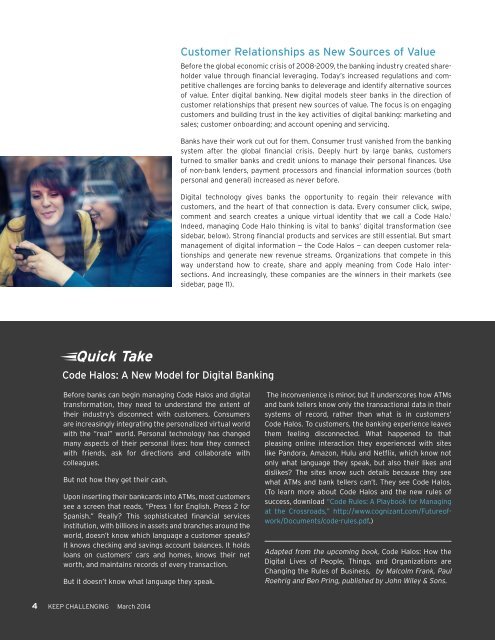Digital-Banking-Enhancing-Customer-Experience-Generating-Long-Term-Loyalty
Digital-Banking-Enhancing-Customer-Experience-Generating-Long-Term-Loyalty
Digital-Banking-Enhancing-Customer-Experience-Generating-Long-Term-Loyalty
Create successful ePaper yourself
Turn your PDF publications into a flip-book with our unique Google optimized e-Paper software.
<strong>Customer</strong> Relationships as New Sources of Value<br />
Before the global economic crisis of 2008-2009, the banking industry created shareholder<br />
value through financial leveraging. Today’s increased regulations and competitive<br />
challenges are forcing banks to deleverage and identify alternative sources<br />
of value. Enter digital banking. New digital models steer banks in the direction of<br />
customer relationships that present new sources of value. The focus is on engaging<br />
customers and building trust in the key activities of digital banking: marketing and<br />
sales; customer onboarding; and account opening and servicing.<br />
Banks have their work cut out for them. Consumer trust vanished from the banking<br />
system after the global financial crisis. Deeply hurt by large banks, customers<br />
turned to smaller banks and credit unions to manage their personal finances. Use<br />
of non-bank lenders, payment processors and financial information sources (both<br />
personal and general) increased as never before.<br />
<strong>Digital</strong> technology gives banks the opportunity to regain their relevance with<br />
customers, and the heart of that connection is data. Every consumer click, swipe,<br />
comment and search creates a unique virtual identity that we call a Code Halo. 1<br />
Indeed, managing Code Halo thinking is vital to banks’ digital transformation (see<br />
sidebar, below). Strong financial products and services are still essential. But smart<br />
management of digital information — the Code Halos — can deepen customer relationships<br />
and generate new revenue streams. Organizations that compete in this<br />
way understand how to create, share and apply meaning from Code Halo intersections.<br />
And increasingly, these companies are the winners in their markets (see<br />
sidebar, page 11).<br />
Quick Take<br />
Code Halos: A New Model for <strong>Digital</strong> <strong>Banking</strong><br />
Before banks can begin managing Code Halos and digital<br />
transformation, they need to understand the extent of<br />
their industry’s disconnect with customers. Consumers<br />
are increasingly integrating the personalized virtual world<br />
with the “real” world. Personal technology has changed<br />
many aspects of their personal lives: how they connect<br />
with friends, ask for directions and collaborate with<br />
colleagues.<br />
But not how they get their cash.<br />
Upon inserting their bankcards into ATMs, most customers<br />
see a screen that reads, ”Press 1 for English. Press 2 for<br />
Spanish.” Really? This sophisticated financial services<br />
institution, with billions in assets and branches around the<br />
world, doesn’t know which language a customer speaks?<br />
It knows checking and savings account balances. It holds<br />
loans on customers’ cars and homes, knows their net<br />
worth, and maintains records of every transaction.<br />
But it doesn’t know what language they speak.<br />
The inconvenience is minor, but it underscores how ATMs<br />
and bank tellers know only the transactional data in their<br />
systems of record, rather than what is in customers’<br />
Code Halos. To customers, the banking experience leaves<br />
them feeling disconnected. What happened to that<br />
pleasing online interaction they experienced with sites<br />
like Pandora, Amazon, Hulu and Netflix, which know not<br />
only what language they speak, but also their likes and<br />
dislikes? The sites know such details because they see<br />
what ATMs and bank tellers can’t. They see Code Halos.<br />
(To learn more about Code Halos and the new rules of<br />
success, download “Code Rules: A Playbook for Managing<br />
at the Crossroads,” http://www.cognizant.com/Futureofwork/Documents/code-rules.pdf.)<br />
Adapted from the upcoming book, Code Halos: How the<br />
<strong>Digital</strong> Lives of People, Things, and Organizations are<br />
Changing the Rules of Business, by Malcolm Frank, Paul<br />
Roehrig and Ben Pring, published by John Wiley & Sons.<br />
4 KEEP CHALLENGING March 2014




